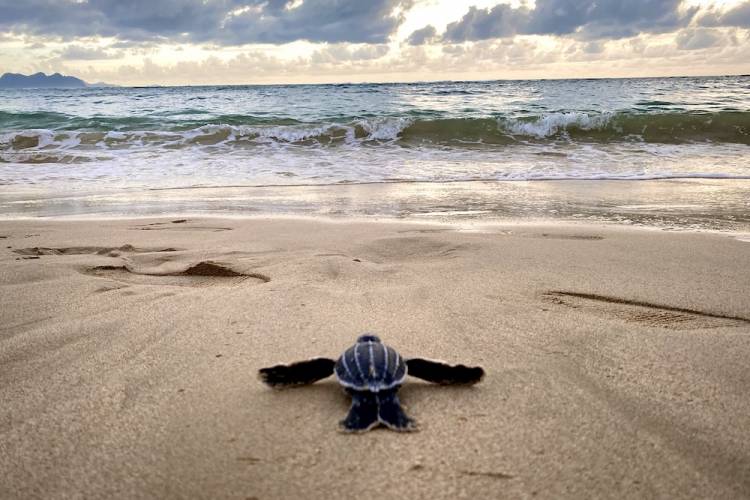Sea Turtle Season in St. Augustine, Florida

One of the most amazing displays of Mother Nature takes place right here in St. Augustine every year. From May to October, thousands of sea turtle eggs are hatched on the shores across St. Augustine. Eventually the baby turtles will hatch and make their way to the ocean to grow up and spend their lives before having hatchlings of their own.
These endangered animals need our help to ensure their safety and longevity to enjoy their nests for years to come. 90% of all sea turtle nesting in the US takes place in Florida so please remember when you spend time at the beach, you share it with a variety of marine animals and it is vital to be respectful of them. As you plan your trip with hopes of seeing this phenomena from afar or helping in conservation efforts, here are some ways you can help out!
Helpful Tips to Save the Sea Turtles
Use sea turtle-friendly lights or no lights at all! Because hatchlings head for the brightest light source, artificial lighting can cause them to begin a fatal trek in the wrong direction away from the ocean. If you live in or are a guest in a beachside property, close drapes and blinds at night, shield or turn off outdoor lights that are visible on the beach. Doing these things not only leads hatchlings to head in the right directions, but also encourages females to come ashore to dig nests and lay their eggs.
Flatten sandcastles and fill in holes! Your little one might be unhappy when that happens, but it’s extremely important to remove any obstacles that might injure or entrap hatchlings on their way to the water and it can also make it difficult for females who are crawling up on the beach to nest. Make sure all beach accessories are taken off the beach when you leave as well since they can also cause problems.
Take all food and trash with you! There are many animals (racoons, foxes, coyotes, etc.) who love our leftovers. Raccoons are one of the chief causes of sea turtle deaths on our beaches. Leftover trash, especially plastic bags, is extremely hazardous to marine animals. Turtles will think a plastic bag is a jellyfish (one of their favorite foods) and swallow it, often causing a fatal obstruction. Also, don’t place beach furniture close to a marked nest. It should be a minimum of 5 feet away.
Program the Florida Wildlife Commission’s (FWC) Wildlife Alert Number (1-888-404-3922) into your phone so if you see a dead, sick, injured, or stranded sea turtle, you can quickly call for assistance. It is also important to report any harassment of turtles or disturbance of nests. They are protected under the Federal Endangered Species Act of 1973 and Florida's Marine Turtle Protection Act (379.2431, Florida Statutes). Hatchlings must crawl to the water by themselves. Scientists believe this trip to the water lets them imprint on their own beach. It is important that you do not touch any marine life you encounter because they may bite, sting, or carry bacteria like Salmonella.
Don’t use fireworks on the beach. It may seem like harmless fun, but loud noises and bright lights can disturb nesting females. Fires on the beach also pose a danger to sea turtles. Any fireworks beyond the sparkler type (shoot up in the sky) are also illegal in the state of Florida.
If you would like to watch a nesting turtle, join an organized sea turtle walk. You can check online to see if these walks are available and how to register. See our full guide to sea turtle nesting season here.
Reminders of Marine Life Laws
Manatees: Touching a manatee is a misdemeanor, penalized with up to 60 days in jail and a $500.00 fine.
Sea Turtles: Touching a sea turtle is illegal, penalized with up to one year in jail with fines up to $25,000.00. This law is taken very seriously because they are an endangered species.
Infractions of these laws are taken very seriously because they are both an endangered species.
